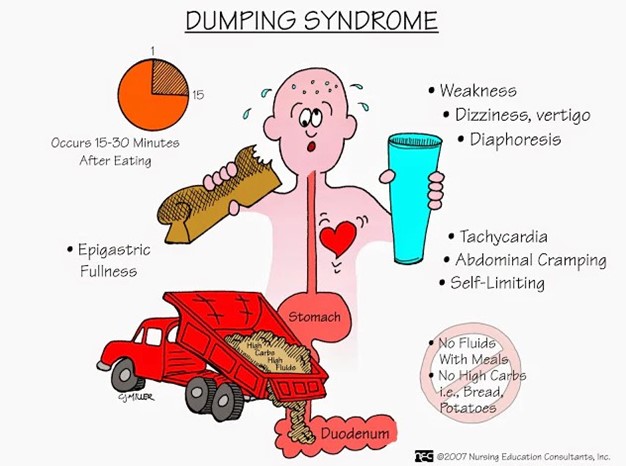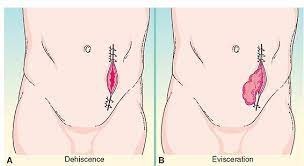In order to prevent dumping syndrome after Gastric Bypass surgery, the nurse will instruct the client to....
Take a brisk walk after eating.
Avoid excessive sugar and carbohydrates.
Increase fluid intake with meals.
Take the proton pump inhibitors as prescribed.
The Correct Answer is B
Dumping syndrome is a common complication after Gastric Bypass surgery, where food moves too quickly from the stomach to the small intestine. It occurs when the undigested contents of the stomach are "dumped" rapidly into the small intestine, leading to symptoms such as nausea, vomiting, abdominal cramps, diarrhea, lightheadedness, and sweating.
To manage dumping syndrome, it is important for the client to avoid foods and beverages that are high in sugar and carbohydrates. Consuming these types of foods can trigger rapid gastric emptying and exacerbate the symptoms. Instead, the client should focus on a well-balanced diet that includes lean proteins, healthy fats, and complex carbohydrates.

Nursing Test Bank
Naxlex Comprehensive Predictor Exams
Related Questions
Correct Answer is ["C","D","E"]
Explanation
The nurse explains that immobilizing a fracture will:
- Help align the bone fragments and reduce movement, which is crucial for proper healing. Immobilization can help maintain the stability of the fracture site, allowing the bones to knit together and heal.
- Help to minimize movement and subsequent pain. It provides support and reduces stress on the injured area, which can help alleviate discomfort and promote a more comfortable healing process.
- Help to minimize movement and reduce the risk of fat globules from bone marrow entering the bloodstream and causing a fat embolism, a potentially serious complication.
Preventing blood clots, preventing malignant hyperthermia, and immobilizing a fracture are not directly related. Preventing blood clots typically involves other measures such as early mobilization, elevation, and medication to prevent deep vein thrombosis. Malignant hyperthermia is a rare, potentially life-threatening reaction to certain medications used during anesthesia, and immobilization does not directly prevent it.
Correct Answer is A
Explanation
Wound evisceration refers to the protrusion of internal organs or tissues through an open wound. In this case, with the separation of the wound and extrusion of the intestine through the opening, it is a clear indication of wound evisceration. It is a surgical emergency that requires immediate medical attention.
Wound dehiscence, on the other hand, refers to the separation or opening of a previously closed surgical incision or wound. It does not involve the extrusion of internal organs or tissues.

Wound infection refers to the presence of infectious microorganisms in the wound, leading to inflammation and other signs of infection.
Wound tunneling refers to the formation of narrow channels or tunnels within the wound, often caused by improper wound healing or infection.
Whether you are a student looking to ace your exams or a practicing nurse seeking to enhance your expertise , our nursing education contents will empower you with the confidence and competence to make a difference in the lives of patients and become a respected leader in the healthcare field.
Visit Naxlex, invest in your future and unlock endless possibilities with our unparalleled nursing education contents today
Report Wrong Answer on the Current Question
Do you disagree with the answer? If yes, what is your expected answer? Explain.
Kindly be descriptive with the issue you are facing.
